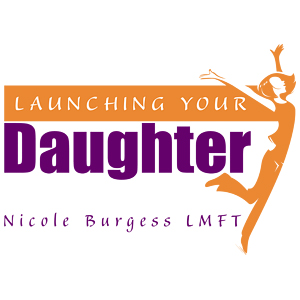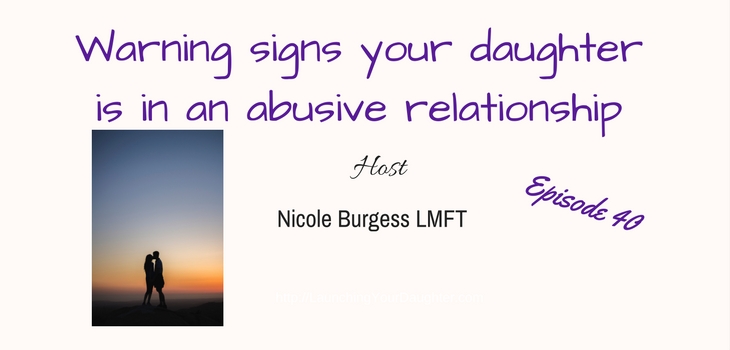Welcome to Launching Your Daughter podcast page. It is available on iTunes, Google Play, Stitcher and now YouTube. If you like what you hear please Subscribe iTunes, Rate or leave a Review.

Ep 40: Warning signs of your daughter in an abusive relationship

Today’s episode is about teen dating abuse and violence. I know this topic can be difficult to hear, but I am encouraging you to listen because unfortunately this continues to be an all to common issue I see in my practice. In the past I co-facilitated a domestic violence batterer’s intervention group for teen boys. They had been charged with being physically abusive toward a partner or family member or a person and were required to attend an either a 26 or 52 week program for perpetrators. The agency I worked at had a group for teen girls and two different groups for adult males and females.
In this episode you will learn:
- Statistics of teen dating abuse and violence
- Warning signs of possible abuse or violence in the relationship
- How to help your daughter
Statistics of teen dating violence
- 1 in 3 high school student experiences some form of dating violence (physical, sexual, emotional or verbal abuse) in their relationship
Love and Respect website states:
- Nearly 1.5 million high school students nationwide experience physical abuse from a dating partner in a single year.
- One in 10 high school students has been purposefully hit, slapped or physically hurt by a boyfriend or girlfriend.
- Girls and young women between the ages of 16 and 24 experience the highest rate of intimate partner violence — almost triple the national average.
- Among female victims of intimate partner violence, 94% of those age 16-19 and 70% of those age 20-24 were victimized by a current or former boyfriend or girlfriend.
- Violent behavior typically begins between the ages of 12 and 18.
- The severity of intimate partner violence is often greater in cases where the pattern of abuse was established in adolescence.
CDC (Centers for Disease Control and Prevention)
- Violence is related to certain risk factors. Risks of having unhealthy relationships increase for teens who —
- Believe that dating violence is acceptable
- Are depressed, anxious, or have other symptoms of trauma
- Display aggression towards peers or display other aggressive behaviors
- Use drugs or illegal substances
- Engage in early sexual activity and have multiple sexual partners
- Have a friend involved in dating violence
- Have conflicts with a partner
- Witness or experience violence in the home
- Dating violence can be prevented when teens, families, organizations, and communities work together to implement effective prevention strategies.
Warning signs of possible abuse
- Checking cell phones, emails or social networks without permission
- Extreme jealousy or insecurity
- Constant belittling or put-downs
- Explosive temper
- Isolation from family and friends
- Making false accusations
- Erratic mood swings
- Physically inflicting pain or hurt in any way
- Possessiveness
- Telling someone what to do
- Repeatedly pressuring someone to have sex
- Behavior change in daughter-more depressed or withdrawn, anxious or seems fearful
What parents and teens can do
- Listen without judgment
- Share your concern with your daughter about how she is being treated in her relationships
- Remind her it is not her fault and she doesn’t deserve to be treated that way
- Encourage her to create a code word or signal to let her friends know she is in danger
- Have a list of important phone numbers in your cell phone or with you at all times.
- Brainstorm what you can do or places you can go if your boyfriend becomes violent
- Tell friends or parents where you are going or what you may do when with boyfriend.
- Call 911 if you are in danger
- Write down what happens in a journal or notebook. (It may be important later on to keep a record of what is happening.)
- Get professional help-support groups for victims of violence, mental health counseling to work through the traumas and regain self-confidence
This podcast is also available on Stitcher, Google Play, YouTube and now iHeartRadio.
Resources Information: (Some maybe affiliate links)
RAINN: https://www.rainn.org/ 800-656-HOPE (4673)
National Domestic Violence Hotline 1-800-799-SAFE (7233) http://www.thehotline.org/
Teen Torment: Overcoming Verbal Abuse at Home and at School by Patricia Evans
[spp-optin]


Nicole Burgess LMFT
Owner of Burgess Counseling and Consulting LLC
I work with teen girls and women in overcoming anxiety through creating a safe place for self-compassion, heart-centered connection and in gaining self-confidence. Call today for your free 15 minute phone consult at 317-840-0490
The information contained on this website including all pages within is for information purposes only and may change at any time without notice. The information within this site is not intended nor should be taken as therapeutic, legal, or otherwise professional or personal advice. Use of this site and/or communication through this site at no time forms a therapeutic relationship between the site user and therapist.
